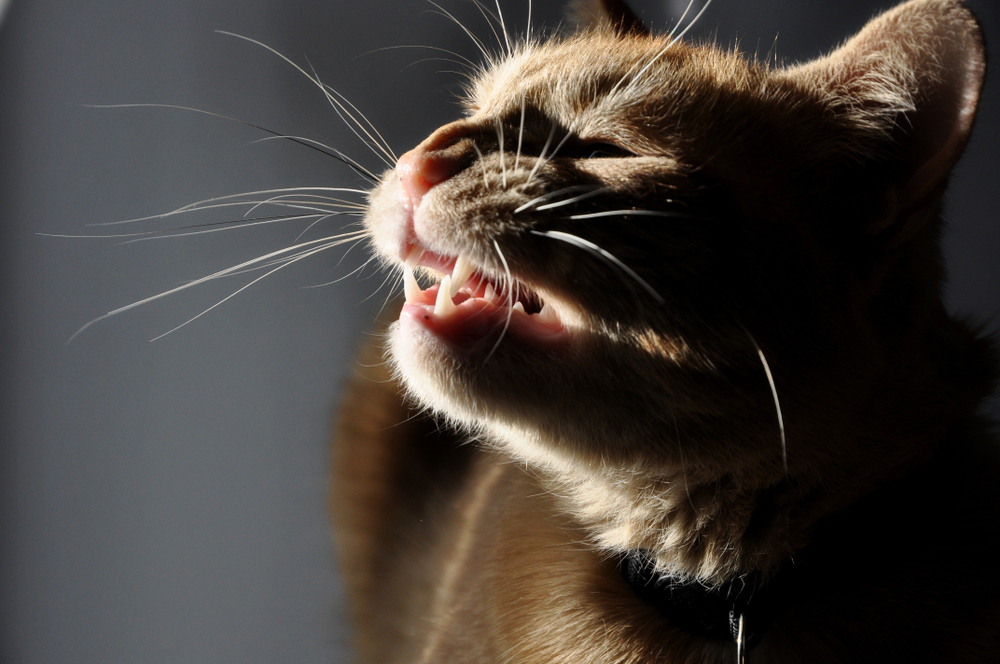Our feline friends differ from dogs in many ways, including many health conditions they suffer. Cats will likely encounter respiratory infections throughout their lives, and some will develop chronic recurrences. The Shuler Veterinary Clinic team recognizes that pet owners have difficulty understanding how indoor cats contract infections, and how they should handle these infections at home. Here, we answer your most frequent questions.
Question: What causes respiratory infections in cats?
Answer: Respiratory infections in cats typically result from common feline viruses, especially feline herpesvirus 1 (FHV-1) and calicivirus. Vaccinations against these viruses are part of all kittens’ initial vaccine series but, unfortunately, they cannot completely prevent transmission and can only blunt severity. Bacteria may also cause a primary infection, or add to a primary viral infection. Fungal infections are possible, but far less common than viruses or bacteria.
Q: Which cats will most likely suffer from respiratory infections?
A: Cats living in shelters, catteries, multi-cat homes, or outdoor cat colonies will most likely suffer from respiratory infections. Since most owned cats are adopted from shelters or rescues, the majority are exposed to infection-causing pathogens during kittenhood. Infections are most common in young kittens when first exposed, but also occur in adults who are emotionally or physically stressed, in older cats, or in cats infected with feline immunodeficiency virus or feline leukemia who have poorly functioning immune systems.
Q: What are respiratory infection signs in cats?
A: Respiratory infection signs in cats mimic those seen in humans with similar infections. Signs include:
- Sneezing
- Runny nose
- Eye discharge or redness
- Congestion
- Coughing
- Lethargy
- Poor appetite
- Fever
Q: Why do some respiratory infections become chronic in cats?
A: The infection most likely to cause recurrent or chronic illness is FVH-1, which most cats are exposed to at some point in their lives. The body cannot clear this virus completely—instead, the virus becomes dormant and lives deep in nerve cells. When a cat is stressed or immunosuppressed, the virus can reactivate—similar to peoples’ cold sore virus or shingles virus, which are also herpesviruses. Some cats simply have a harder time suppressing the virus and will have more frequent problems.
Q: My cat has chronic eye problems—is this related to a respiratory infection?
A: FHV-1 and several other common respiratory pathogens are well-known for causing eye issues. Chronic FHV-1 eye infection causes recurrent conjunctivitis and eye ulcers and can lead to more serious conditions like corneal inflammation (i.e., keratitis) or dead cornea areas (i.e., corneal sequestrum). Cats with ongoing problems compatible with FHV-1 may benefit from treatment by a veterinary ophthalmologist.
Q: Can I treat my cat’s respiratory infection at home?
A: Some mild respiratory infections can be managed at home. If your cat has sneezing, runny eyes, or nasal discharge, but their energy level and appetite seems normal, you can try treating them at home for a few days. Keep their eyes and nasal passages clear by removing debris with a soft, warm cloth each day, and keep them in a steamy bathroom while you shower to help clear congestion and improve breathing. If your cat’s symptoms include appetite loss, squinting, coughing, or extreme lethargy, seek veterinary care. In addition, if you are ever concerned about your cat’s condition, please don’t hesitate to contact our team for advice or to schedule an examination.
Q: How do veterinarians treat respiratory infections in cats?
A: Cats who present to the clinic with respiratory signs may require diagnostic testing, such as X-rays or infectious disease panels, to rule out other disease processes and isolate the problem. Viral infection treatment is supportive but may include antibiotics to prevent or treat secondary bacterial involvement. Eye drops or ointments may improve eye comfort and reduce swelling, redness, or discharge.
Q: How can I prevent respiratory infections in my cat(s) at home?
A: The best way to protect your cat from respiratory infections is to keep their vaccinations up to date and ensure they receive regular wellness visits. In addition, you can help prevent respiratory infections in your cat by reducing their overall stress levels. Maintain a predictable daily routine, ensure your cats are not competing over resources, play or cuddle daily, and avoid making sudden changes around the house. A new cat in your home must be quarantined away from other cats for a few weeks before you make slow, controlled introductions.
Cats are special creatures with unique health issues, including their tendency to develop upper respiratory infections. Often, these infections require minimal treatment and care, but you should call or go online to make an appointment with our Shuler Veterinary Clinic team if you have any concerns about your feline friend.
Did you know that Shuler Veterinary Clinic has several sister locations in the Mount Pleasant area? Find the one nearest you at Animal Hospitals of the Lowcountry, or visit our hospital websites—Mount Pleasant Animal Hospital and Safe Harbor Animal Hospital.









Leave A Comment